pGreenFire1-LXRE-in-CETP
- Sort responsive cells with dscGFP
- Measure activity with luciferase
- Leverage SBI’s highly-regarded lentivectors
- Create stable signaling pathway reporter cell lines
- Introduce reporters into difficult-to-transfect cell types, including primary and non-dividing mammalian cell lines
Products
| Catalog Number | Description | Size | Price | Quantity | Add to Cart | |||
|---|---|---|---|---|---|---|---|---|
| TR109A-P | pGreenFire1-LXRE in CETP (HepG2 cell line) | 2 x 10^6 Cells | $3299 |
|
||||
| TR109PA-P | pGreenFire1-LXRE in CETP (plasmid) | 10 µg | $779 |
|
||||
| TR109VA-P | pGreenFire1-LXRE in CETP (pre-packaged virus) | >2 x 10^6 IFUs | $779 |
|
||||
Overview
Overview
Monitor cholesterol homeostasis signal transduction in real time
With SBI’s line of pGreenFire1 Pathway Reporters, you can monitor signal transduction in real time. These vectors leverage our reliable lentivector technology and save you time—our pre-built signal transduction pathway reporters come as ready-to-package lentivector plasmid*, ready-to-transduce pre-packaged lentivirus, and as a ready-to-study cell line. The pGreenFire1-LXRE-in-CETP Lentivector co-expresses a destabilized copepod GFP (dscGFP; 2-hour half-life) and luciferase from the Liver X Receptor (LXR) response elements (LXREs) and neighboring regions in the CETP promoter paired with a minimal CMV promoter (mCMV). The mCMV promoter alone delivers negligible expression, but when downstream of the LXRE/CETP transcriptional elements, drives expression of dscGFP and luciferase in response to LXR activity. The result is the ability to quantitatively measure LXR activity at the CETP promoter by fluorescence and luciferase activity.
- Sort responsive cells with dscGFP
- Measure activity with luciferase
- Leverage SBI’s highly-regarded lentivectors
- Create stable signaling pathway reporter cell lines
- Introduce reporters into difficult-to-transfect cell types, including primary and non-dividing mammalian cell lines

The pGreenFire1-LXRE-in-CETP Lentivector is available as a lentivector, pre-packaged virus, and a stable cell line created from the pGreenFire1-LXRE-in-CETP transduced into HepG2 cells.
*Please note that these vectors only function properly when transduced. Transfection keeps the constitutive RSV promoter intact, leading to nonspecific expression of the reporter genes.References
How It Works
Supporting Data
Supporting Data
See our transcriptional response element reporters in action
Monitor oncogenic pathway reporters
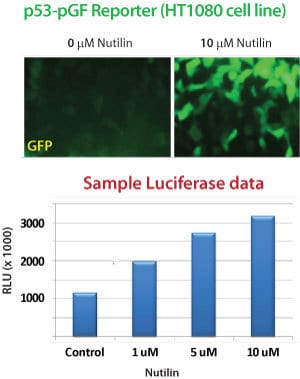
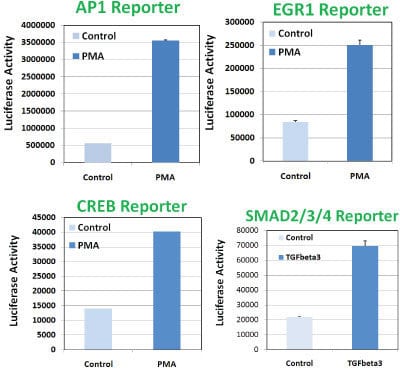 Develop target gene-specific LXR agonists that could regulate reverse cholesterol transport without increasing lipogenesis
Develop target gene-specific LXR agonists that could regulate reverse cholesterol transport without increasing lipogenesis
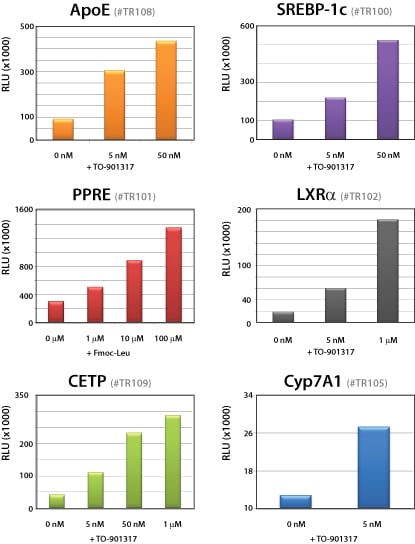 General pGreenFire data examples
General pGreenFire data examples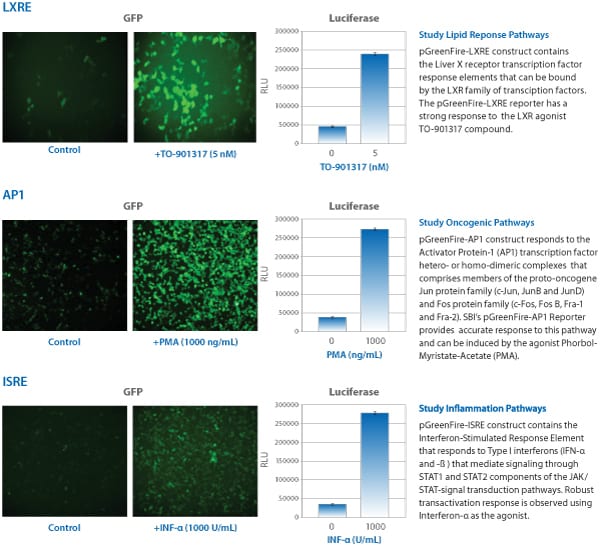 Monitoring NF-κB transactivation
Monitoring NF-κB transactivation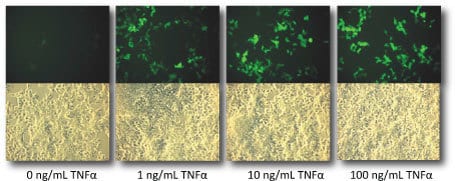
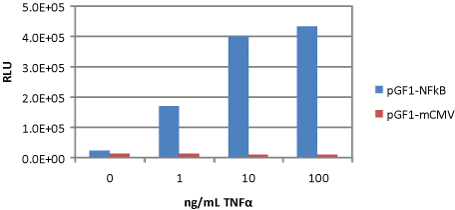
FAQs
Documentation
Citations
Related Products
Products
| Catalog Number | Description | Size | Price | Quantity | Add to Cart | |||
|---|---|---|---|---|---|---|---|---|
| TR109A-P | pGreenFire1-LXRE in CETP (HepG2 cell line) | 2 x 10^6 Cells | $3299 |
|
||||
| TR109PA-P | pGreenFire1-LXRE in CETP (plasmid) | 10 µg | $779 |
|
||||
| TR109VA-P | pGreenFire1-LXRE in CETP (pre-packaged virus) | >2 x 10^6 IFUs | $779 |
|
||||
Overview
Overview
Monitor cholesterol homeostasis signal transduction in real time
With SBI’s line of pGreenFire1 Pathway Reporters, you can monitor signal transduction in real time. These vectors leverage our reliable lentivector technology and save you time—our pre-built signal transduction pathway reporters come as ready-to-package lentivector plasmid*, ready-to-transduce pre-packaged lentivirus, and as a ready-to-study cell line. The pGreenFire1-LXRE-in-CETP Lentivector co-expresses a destabilized copepod GFP (dscGFP; 2-hour half-life) and luciferase from the Liver X Receptor (LXR) response elements (LXREs) and neighboring regions in the CETP promoter paired with a minimal CMV promoter (mCMV). The mCMV promoter alone delivers negligible expression, but when downstream of the LXRE/CETP transcriptional elements, drives expression of dscGFP and luciferase in response to LXR activity. The result is the ability to quantitatively measure LXR activity at the CETP promoter by fluorescence and luciferase activity.
- Sort responsive cells with dscGFP
- Measure activity with luciferase
- Leverage SBI’s highly-regarded lentivectors
- Create stable signaling pathway reporter cell lines
- Introduce reporters into difficult-to-transfect cell types, including primary and non-dividing mammalian cell lines

The pGreenFire1-LXRE-in-CETP Lentivector is available as a lentivector, pre-packaged virus, and a stable cell line created from the pGreenFire1-LXRE-in-CETP transduced into HepG2 cells.
*Please note that these vectors only function properly when transduced. Transfection keeps the constitutive RSV promoter intact, leading to nonspecific expression of the reporter genes.References
How It Works
Supporting Data
Supporting Data
See our transcriptional response element reporters in action
Monitor oncogenic pathway reporters

 Develop target gene-specific LXR agonists that could regulate reverse cholesterol transport without increasing lipogenesis
Develop target gene-specific LXR agonists that could regulate reverse cholesterol transport without increasing lipogenesis
 General pGreenFire data examples
General pGreenFire data examples Monitoring NF-κB transactivation
Monitoring NF-κB transactivation


